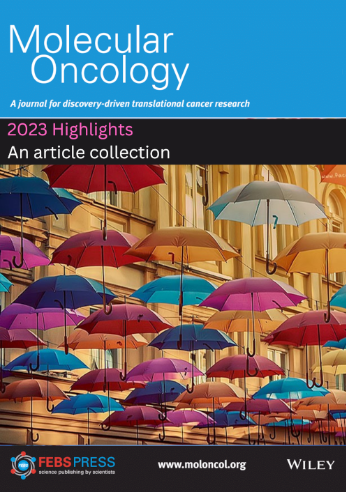转录谱分析揭示了人类乳腺肿瘤的一个亚群,它们保留了wt TP53,但表现出p53相关的突变特征
IF 5
2区 医学
Q1 ONCOLOGY
引用次数: 6
摘要
TP53基因突变在人类癌症中非常常见。虽然这些突变取消了野生型(wt) p53蛋白的抑瘤活性,但其中一些突变也赋予突变蛋白致癌功能获得(GOF),促进癌症进展。然而,即使没有突变,p53也可能获得改变的功能;特别是,对培养细胞的实验表明,wt p53可以重新连接,以采用突变样特征,以响应生长因子或模拟癌症的遗传操作。为了评估这种重新布线是否也发生在人类肿瘤中,我们询问了METABRIC乳腺癌(BC)数据集中的基因表达谱和通路放松模式作为TP53基因突变状态的函数。利用机器学习的力量,我们优化了ER+Her2-患者的基因表达分类器,该分类器可以区分携带TP53突变的肿瘤和保留TP53突变的肿瘤。有趣的是,一小部分wt TP53肿瘤显示出与TP53突变肿瘤明显相似的基因表达和通路失调模式。此外,与TP53突变肿瘤相似,这些“假突变”病例表现出增殖增强的特征,预后比典型的wt p53肿瘤更差。值得注意的是,这些肿瘤显示了在BC细胞系中被p53 GOF突变体正调控的基因的上调。因此,这些肿瘤可能受益于突变的p53相关活性,而不必积累TP53突变。本文章由计算机程序翻译,如有差异,请以英文原文为准。
Transcriptional profiling reveals a subset of human breast tumors that retain wt TP53 but display mutant p53‐associated features
TP53 gene mutations are very common in human cancer. While such mutations abrogate the tumor suppressive activities of the wild type (wt) p53 protein, some of them also endow the mutant protein with oncogenic gain-of-function (GOF), facilitating cancer progression. Yet, p53 may acquire altered functionality even without being mutated; in particular, experiments with cultured cells revealed that wt p53 can be rewired to adopt mutant-like features in response to growth factors or cancer-mimicking genetic manipulations. To assess whether such rewiring also occurs in human tumors, we interrogated gene expression profiles and pathway deregulation patterns in the METABRIC breast cancer (BC) dataset as a function of TP53 gene mutation status. Harnessing the power of machine learning, we optimized a gene expression classifier for ER+Her2- patients that distinguishes tumors carrying TP53 mutations from those retaining wt TP53. Interestingly, a small subset of wt TP53 tumors displayed gene expression and pathway deregulation patterns markedly similar to those of TP53-mutated tumors. Moreover, similar to TP53 mutated tumors, these “pseudomutant” cases displayed a signature for enhanced proliferation and had worse prognosis than typical wt p53 tumors. Notably, these tumors revealed upregulation of genes which, in BC cell lines, were reported to be positively regulated by p53 GOF mutants. Thus, such tumors may benefit from mutant p53-associated activities without having to accrue TP53 mutations.
求助全文
通过发布文献求助,成功后即可免费获取论文全文。
去求助
来源期刊

Molecular Oncology
医学-肿瘤学
CiteScore
12.60
自引率
1.50%
发文量
203
审稿时长
6-12 weeks
期刊介绍:
Molecular Oncology highlights new discoveries, approaches, and technical developments, in basic, clinical and discovery-driven translational cancer research. It publishes research articles, reviews (by invitation only), and timely science policy articles.
The journal is now fully Open Access with all articles published over the past 10 years freely available.
 求助内容:
求助内容: 应助结果提醒方式:
应助结果提醒方式:


